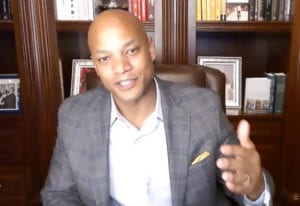Who is a member?
Our members are the local governments of Massachusetts and their elected and appointed leadership.

Wes Moore gives the opening keynote address on Jan. 21.
During this time of pandemic and political upheaval, leaders need to elevate their missions and fight for the people who need them most, said bestselling author and social entrepreneur Wes Moore during the MMA’s 42nd Annual Meeting & Trade Show on Jan. 21.
In a keynote address titled “Evolve, Adapt, Inspire: The Tenets of Transformational Leadership,” Moore recognized the unprecedented challenges faced by local leaders, in the forms of COVID-19, racial injustice and economic fallout. These challenges, however, also give leaders an opportunity to think about what they really need to achieve – and the people they need to serve.
“If we never forget about who we’re fighting for, we won’t stop fighting for them,” Moore said. “Especially at a time when we know it’s going to be hard, especially at a time when we know that budgets are going to be tight, especially at a time when we know that decisions won’t be simple – this is where you matter most.”
He said the COVID crisis exposed problems that have long existed. Even before the pandemic, 44% of Americans didn’t have $400 in cash to cover an emergency expense, and one in five children were going to bed hungry. Of the people who have lost jobs during the pandemic, 24% were already living in poverty. Even before COVID, he said, leaders had work to do.
“This is not just about the virus,” Moore said. “It’s about neglect. It’s about the fact that we’re watching the impacts of COVID-19, and … not everyone has felt its impacts equally. Not everybody sees just how devastating and damaging this virus has been.”
As CEO of the Robin Hood Foundation, the largest anti-poverty nonprofit in New York City, Moore speaks frequently about inequality. His books include “Five Days: The Fiery Reckoning of an American City,” which examines the aftermath of Freddie Gray’s 2015 death in police custody in Moore’s hometown of Baltimore.
In his talk, Moore explained how the adversity he faced as a child helped shape his views and work. His father died when Moore was a little boy, leaving his mother, then in her 20s, alone to raise three children. Moore and his family moved into his grandparents’ small home in the South Bronx, where he started getting into trouble.
“The first time that I felt handcuffs on my wrists is when I was 11 years old,” Moore said. “Eleven. In the Bronx.”
Frustrated with his behavior, Moore’s mother sent him to a Pennsylvania military academy, from which he ran away five times in the first four days. Between the reminders from his mother that, “It is not all about you,” and his experiences with his fellow cadets, Moore said he grew to appreciate the importance of interconnectedness and cooperation.
He said we need empathy and collective action now more than ever, as people face growing instability in their lives.
“We are hitting a moment right now where, frankly, your jurisdictions, your areas, your constituents, your people – people who rely on you, the people who need you – they are crying out because of what we know are the distinct realities of this moment in their lives,” Moore said, “where certain things that felt certain no longer feel certain, certain guarantees that we promised no longer feel guaranteed, certain hopes that maybe your people might have had might now seem laughable.”
When the pandemic ends, leaders must aspire to do more than just return to pre-COVID conditions – they should strive toward a collective agenda and an inclusive framework, and realize that growth doesn’t need to be discriminatory. Leaders should be ready to make hard decisions, he said, and to bring people together from across the political spectrum to advocate for the right causes. Local leaders aren’t just someone who holds a seat or an office.
“You’re a dream protector,” Moore said. “You’re protecting the dreams of every one of your constituents, and your responsibility, my responsibility, is to make sure that we’re protecting the dreams of those who we know do not have other people that are protecting them.”
Moore fielded a number of questions and described how he manages to remain positive during these times. He said he imagines describing the struggles of today to abolitionist Harriet Tubman or civil rights activist Rosa Parks. People have overcome tough times before, he said. Instead of spending “all day long just mired in darkness,” people must keep pushing forward.
“In many ways optimism is a choice, as to what we choose to spend our time focusing on,” Moore said.
He urged leaders to measure an organization’s anti-bias efforts on the same level as financial benchmarks and other performance metrics.
“Do you have someone who’s actually going in and measuring some of these other things when it comes to combating systemic racism?” he asked. “Both reminding people that it’s real, but also showing people what progress looks like in order for us to get there?”
When addressing controversial issues, local leaders should examine how and why people come to the conclusions they do. He urged officials to listen humbly and with open minds.
“I don’t know if local officials are always supposed to have the answers,” Moore said. “I think what local officials are being asked to do is to listen to the concerns and try to unearth where the answers have already been developed.”